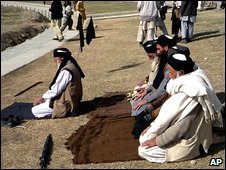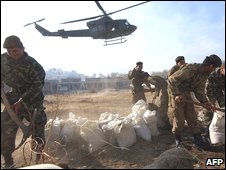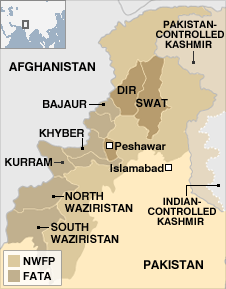
The Taleban say they will release all prisoners they are holding
|
Taleban insurgents in the troubled north-western Swat valley of Pakistan have announced an indefinite ceasefire.
The announcement follows a deal struck last week between a radical cleric and authorities that brings Sharia law in return for an end to the insurgency.
The Taleban have been assessing that deal and Tuesday's move followed a meeting held by the group's leader in the region, Maulana Fazlullah.
The scenic valley of Swat has long been blighted by militant violence.
The latest truce announcement comes a day after militants in Bajaur district called a unilateral ceasefire with security forces there.
The government responded on Tuesday by ceasing military operations in Bajaur for four days.
'Goodwill gesture'
"Today the shura [consultative council] met under Maulana Fazlullah and decided to hold a ceasefire for an indefinite period," Taleban spokesman in Swat, Muslim Khan, was quoted by the news agency AFP as saying.
"We are releasing all prisoners unconditionally. Today we released four paramilitary soldiers and we will release all security personnel in our custody as a goodwill gesture," he said.
A previous 10-day truce announced by the militants was set to expire on Wednesday.
The announcement comes a day after the army confirmed it was halting military operations in the region, although not leaving.
The cleric, Sufi Mohammad, who is also Maulana Fazlullah's father-in-law, has been mediating between the government and the militants.
On Monday, he urged the militants to end the patrolling of streets and to allow the government to set up the Islamic courts they have been fighting for.
Swat has been the scene of bloody clashes between militants and government forces since November 2007.
More than 1,000 civilians have died in shelling by the army or from beheadings sanctioned by the Taleban. Thousands more have been displaced.
The Taleban have also destroyed nearly 200 schools, most of them for girls, during a sustained campaign against secular education in Swat.
An earlier peace agreement broke down in mid-2008.
The BBC's Barbara Plett in Islamabad says there is concern that this peace deal will also not last, with some analysts believing the Taleban want to control territory, not just amend the legal system.
Earlier this month, the North West Frontier Province government signed an agreement with Sufi Mohammad's proscribed Tanzim-e-Nifaz-e-Shariat Mohammadi (TNSM) for the implementation of a Sharia justice system in Swat.
Sufi Mohammad, who opposes militancy, led thousands of TNSM workers into Swat to set up a peace camp there and to start talks with Maulana Fazlullah.
Preconditions
The BBC's M Ilyas Khan, who was recently in Swat, says the militants are now likely to close their checkpoints in the region as the first step towards the new justice system.

The Pakistan army's battle in Swat since 2007 has been bloody
|
On Monday, the TNSM announced 10 preconditions for its successful implementation.
These included the evacuation of all schools and hospital buildings by the army and an end to all security checks that hamper the movement of people.
The TNSM has called on the government to station troops away from civilian areas.
It urged the government to compensate families that suffered human and material losses and called on thousands of displaced people to return to their homes.
The ceasefire moves in Swat have been echoed in Bajaur.
However, the unilateral truce called by the Taleban there follows a series of strategic gains by the military.
On Tuesday, local government official Shafirullah Khan told AFP the security forces would observe a four-day ceasefire across Bajaur in response.
A senior security official confirmed the move, saying it was a "goodwill gesture".
Correspondents say the truce deals have caused disquiet in the US and the issue will be high on the agenda as Pakistan's Foreign Minister Shah Mehmood Qureshi and army chief Ashfaq Pervez Kayani meet US Secretary of State Hillary Clinton and joint Pakistan-Afghan envoy Richard Hobrooke in Washington this week.
|










Bookmark with:
What are these?